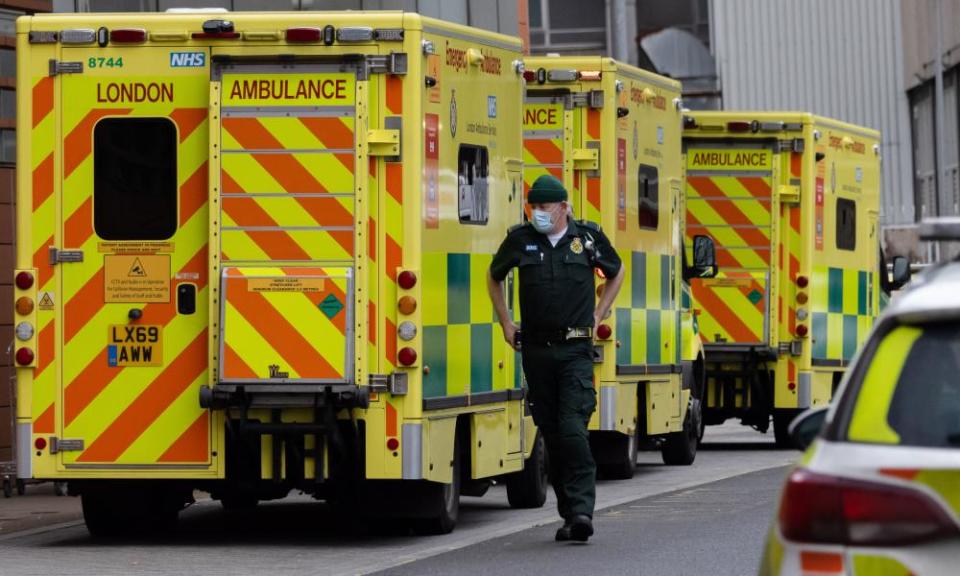Hospitals may have to reintroduce visitor bans, NHS chief says

A “very tough” few weeks will put the health service under such enormous pressure that hospital bosses could be forced to reintroduce a ban on visitors, a health chief has said.
Matthew Taylor, the chief executive of the NHS Confederation, which represents NHS trusts in England, Wales and Northern Ireland, told BBC Breakfast on Saturday: “Hospital managers have to make very difficult choices and excluding visitors is one of those very difficult choices.
“It’s not something that anybody wants to do. It’s a last resort. But, when you’re facing the kind of pressures the health service is going to be under for the next few weeks, this is the kind of thing managers have to do.
“I understand how much people want to return to normal and I’m confident that, as this year progresses, we will be able to do that, and we all hope that 2022 is the year in which coronavirus just becomes an illness that we live with, not an illness that dominates our lives. But you can have the optimism but still recognise the next few weeks are going to be very tough and we need to do whatever is necessary to get us through these next few weeks.”
Earlier this week, the Times reported that the government was also considering creating a rule that hospitals should not force women to give birth or attend scans without their partners present, even if tougher restrictions were deemed necessary to curb the spread of Omicron.
The NHS effort to deal with Omicron is being hampered because substantial numbers of patients cannot be discharged from hospital despite being fit to return home, NHS leaders have said.
default
NHS England figures show that 9,213 patients were forced to stay in hospital on Christmas Day because they could not be supported to go home.
On Boxing Day, the number of patients in hospital for more than three weeks who were unable to leave had reached 4,124.
Some care homes are not accepting patients because they do not have the staff to deal with them, according to Chris Hopson, the chief executive of NHS Providers.
Staff absences also mean that hospitals in England are unable to deal with some non-urgent treatments, such as physiotherapy and rehabilitation, which are vital for enabling patients to leave hospital. In some hospitals, up to a quarter of beds are filled by people who could otherwise be discharged, Hopson said.
The NHS situation report, published on Friday, showed that medical staff had managed to help more than 10,000 people a day leave hospital in the run-up to Christmas.
Staff absences due to Covid have more than doubled in the past month, from 11,375 on 29 November to 24,632 by Boxing Day. “We saw some progress in the run-up to Christmas in discharging patients who were medically fit to return home or other community settings,” Hopson said.
“That reflected a lot of work to free up capacity to prepare for the threat from Omicron. But this remains a real problem and we know from talking to trust chief executives that in some hospitals delayed discharges can account for 20-25% of the bed base.
“In the last 48 hours, trust CEOs have been pointing to the fact that growing staff absences mean it’s getting harder to maintain NHS rehabilitation and step-down services, and there are similar problems in social care. We’re also now hearing of some care homes being closed to new admissions because of staff absences, or Omicron outbreaks, or both.”
The news comes as the health secretary, Sajid Javid, said further restrictions on freedom in England “must be an absolute last resort”, amid a record-breaking wave of infections due to the Omicron variant.
The current wave will, however, “test the limits of finite NHS capacity even more than a typical winter”, Javid said, as hospital admissions in England climbed to their highest since last January.
Writing in the Daily Mail, Javid said England had “welcomed in 2022 with some of the least restrictive measures in Europe”, after the government decided against ramping up protective rules – a move that put Downing Street at odds with leaders of the devolved countries, who had opted for restrictions on nightclubs, other hospitality venues and new year celebrations.
“Curbs on our freedom must be an absolute last resort and the British people rightly expect us to do everything in our power to avert them,” Javid wrote.
“Since I came into this role six months ago I’ve also been acutely conscious of the enormous health, social and economic costs of lockdowns. So I’ve been determined that we must give ourselves the best chance of living alongside the virus and avoiding strict measures in the future.”
Despite his optimism, the health secretary said the time lag between infections and hospital admissions meant it was “inevitable that we will still see a big increase” in the number of people with Covid needing treatment over the next month, and warned that the pandemic was “still far from over”.

 Yahoo Finance
Yahoo Finance 